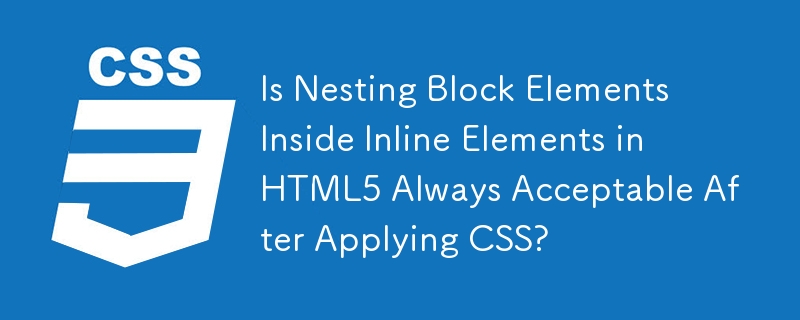 Web Front-end
Web Front-end
 CSS Tutorial
CSS Tutorial
 Is Nesting Block Elements Inside Inline Elements in HTML5 Always Acceptable After Applying CSS?
Is Nesting Block Elements Inside Inline Elements in HTML5 Always Acceptable After Applying CSS?
Is Nesting Block Elements Inside Inline Elements in HTML5 Always Acceptable After Applying CSS?

Breaking the CSS Rule: Inline Elements Containing Block Elements
Traditionally, nesting block elements within inline elements was considered a violation of HTML structure. However, in HTML5, this practice becomes permissible. Does this mean it is acceptable to convert a block element to inline even if it encloses another block element?
The CSS Specification's View
According to the CSS 2.1 Specification, when an inline element contains a block-level element, the inline element splits into two separate boxes, enclosing the block element and its consecutive block-level siblings. These resulting anonymous block boxes become siblings to the original inline element.
Example:
Consider the following HTML markup and CSS rules:
<div><p>This is a paragraph</p></div>
div {
display: inline;
}In this scenario, the div becomes inline, while the p element remains block-level by default. According to CSS 2.1, this results in the div being broken into two anonymous block boxes around the p element.
Browser Implementation and Validity
The CSS specification provides guidance on browser behavior, but implementation consistency and interpretation among modern browsers may vary. Whether or not such nesting is considered valid or not after applying CSS rules depends on the particular browser and its implementation.
Conclusion
While HTML5 allows nesting block elements within inline elements, converting a block element to inline when it already contains a block element presents a gray area. The behavior is technically specified in CSS but subject to browser interpretation and implementation. It's crucial to consider browser compatibility and the intended behavior of your web application before employing this practice.
The above is the detailed content of Is Nesting Block Elements Inside Inline Elements in HTML5 Always Acceptable After Applying CSS?. For more information, please follow other related articles on the PHP Chinese website!

Hot AI Tools

Undresser.AI Undress
AI-powered app for creating realistic nude photos

AI Clothes Remover
Online AI tool for removing clothes from photos.

Undress AI Tool
Undress images for free

Clothoff.io
AI clothes remover

Video Face Swap
Swap faces in any video effortlessly with our completely free AI face swap tool!

Hot Article

Hot Tools

Notepad++7.3.1
Easy-to-use and free code editor

SublimeText3 Chinese version
Chinese version, very easy to use

Zend Studio 13.0.1
Powerful PHP integrated development environment

Dreamweaver CS6
Visual web development tools

SublimeText3 Mac version
God-level code editing software (SublimeText3)

Hot Topics
 Vue 3
Apr 02, 2025 pm 06:32 PM
Vue 3
Apr 02, 2025 pm 06:32 PM
It's out! Congrats to the Vue team for getting it done, I know it was a massive effort and a long time coming. All new docs, as well.
 Building an Ethereum app using Redwood.js and Fauna
Mar 28, 2025 am 09:18 AM
Building an Ethereum app using Redwood.js and Fauna
Mar 28, 2025 am 09:18 AM
With the recent climb of Bitcoin’s price over 20k $USD, and to it recently breaking 30k, I thought it’s worth taking a deep dive back into creating Ethereum
 Can you get valid CSS property values from the browser?
Apr 02, 2025 pm 06:17 PM
Can you get valid CSS property values from the browser?
Apr 02, 2025 pm 06:17 PM
I had someone write in with this very legit question. Lea just blogged about how you can get valid CSS properties themselves from the browser. That's like this.
 Stacked Cards with Sticky Positioning and a Dash of Sass
Apr 03, 2025 am 10:30 AM
Stacked Cards with Sticky Positioning and a Dash of Sass
Apr 03, 2025 am 10:30 AM
The other day, I spotted this particularly lovely bit from Corey Ginnivan’s website where a collection of cards stack on top of one another as you scroll.
 A bit on ci/cd
Apr 02, 2025 pm 06:21 PM
A bit on ci/cd
Apr 02, 2025 pm 06:21 PM
I'd say "website" fits better than "mobile app" but I like this framing from Max Lynch:
 Using Markdown and Localization in the WordPress Block Editor
Apr 02, 2025 am 04:27 AM
Using Markdown and Localization in the WordPress Block Editor
Apr 02, 2025 am 04:27 AM
If we need to show documentation to the user directly in the WordPress editor, what is the best way to do it?
 Comparing Browsers for Responsive Design
Apr 02, 2025 pm 06:25 PM
Comparing Browsers for Responsive Design
Apr 02, 2025 pm 06:25 PM
There are a number of these desktop apps where the goal is showing your site at different dimensions all at the same time. So you can, for example, be writing
 Why are the purple slashed areas in the Flex layout mistakenly considered 'overflow space'?
Apr 05, 2025 pm 05:51 PM
Why are the purple slashed areas in the Flex layout mistakenly considered 'overflow space'?
Apr 05, 2025 pm 05:51 PM
Questions about purple slash areas in Flex layouts When using Flex layouts, you may encounter some confusing phenomena, such as in the developer tools (d...





